Job Analysis
Individual is a new 26-year-old registered nurse who has worked in the healthcare facility for six months.
She has been seconded to the critical care unit (night shift).
By virtue of being new in the unit, she has been given lighter duties that include:
- taking vital signs and assessing patients’ conditions;
- assisting physicians during unit rounds;
- collaborating with colleagues in the critical care team;
- administering intravenous fluids and medications;
- acting as a patient advocate;
- ensuring all medical gadgets are functioning normally;
- ordering diagnostic tests.
These job roles and responsibilities demonstrate the main characteristics of the position (Busi, 2012).
- The principles of effective coaching proposed by Dessler (2015) are used to develop a plan that addresses the needs of the new registered nurse from the perspective of a nurse manager.
- These coaching principles include (1) talking in terms of objective work data, (2) avoiding getting personal, (3) encouraging the individual to talk, and (4) getting an agreement.
- The principle of objective work data is used in job analysis to capture critical information about the roles and responsibilities of the new nurse in the healthcare organization (Dessler, 2015).
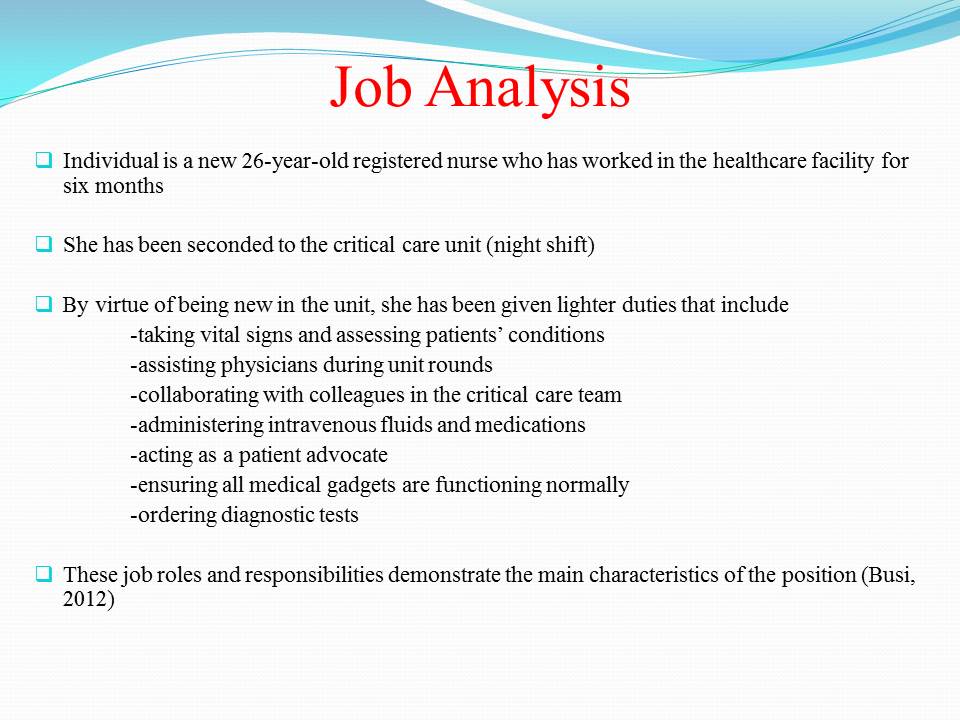
Issues & Expected Outcomes
Current Performance
- Performance is not satisfactory due to mistakes in taking patients’ vital signs;
- Patient complaints have been noted due to persistent medication errors, ignorance to change intravenous tubes on time, and rudeness;
- There has been poor interpersonal relationships with colleagues as the nurse likes to keep to herself most of the times.
Desired Performance
- Zero mistakes in taking vital signs;
- Minimal or zero customer complaints arising from medication errors and ignorance to change gadgets;
- Satisfactory nurse-patient relationships;
- Satisfactory nurse-to-nurse relationships within the unit.
- The principles of encouraging a person to talk and using objective work data are used to evaluate the nurse’s current performance on the job and also to relate the performance to the expectations set by the organization.
- The principle of getting an agreement is used to design mutually agreeable strategies to reinforce commitment to change.
Strategies to Reinforce Commitment
- “Providing corrective and positive feedback in a meaningful way to reinforce and improve employee performance” (Rafferty & Fairbrother, 2015, p. 1250);
- Facilitating skills acquisition and implementation within the unit;
- Providing the needed organizational support;
- Using team meetings to spur integration and encourage the building of interpersonal relationships among nurses;
- Using coaching skills to facilitate “courage, motivation, commitment, and confidence” (Rafferty & Fairbrother, 2015, pp. 1252-1253).
Follow-Up Plan
Critical incident method will be used to keep track of the mistakes or undesirable behaviors demonstrated by the nurse over a period of three months, before discussing them using the feedback approach (Dessler, 2015).
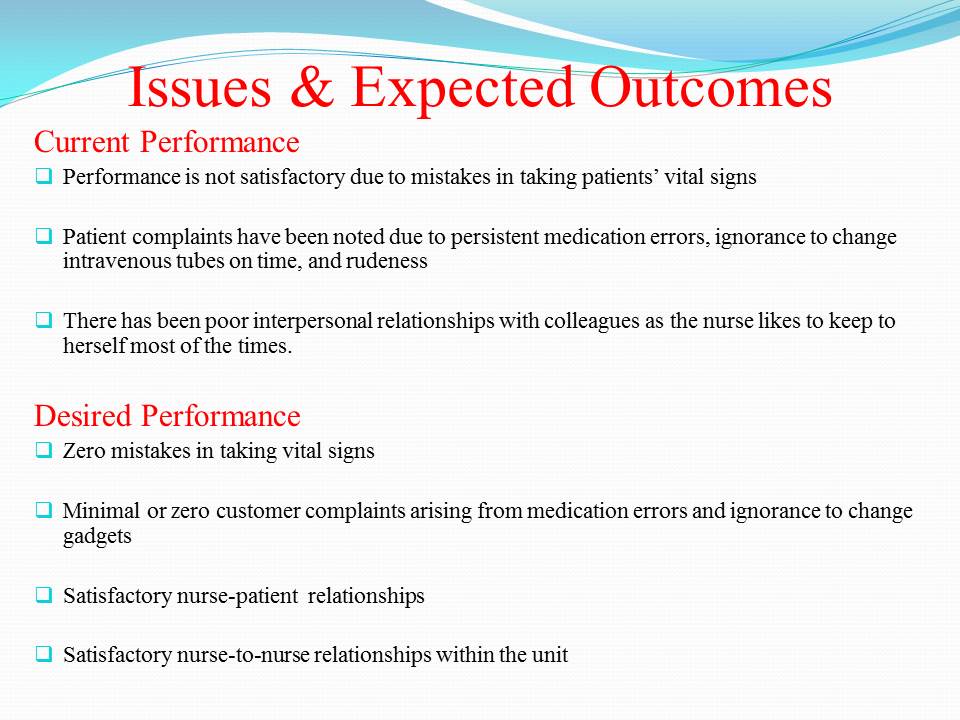
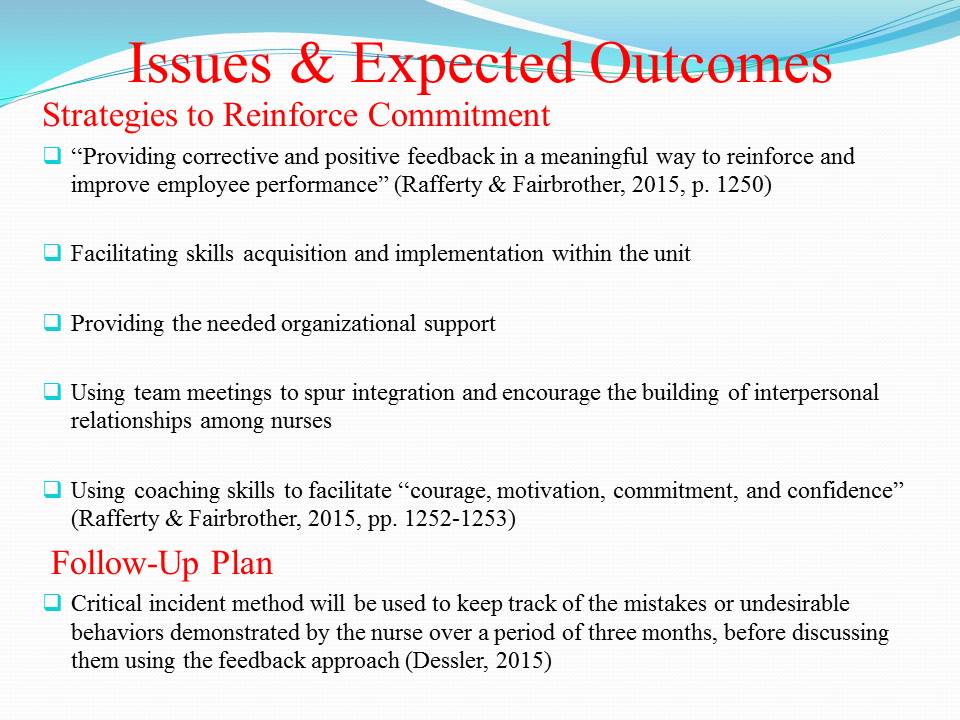
Alignment of Action Plan
Action plan must be able to increase employee performance in line with the hospital’s mission of “improving the well-being of patients and communities by delivering compassionate and patient-centered care”.
Performance and patient satisfaction are consistent with the hospital’s vision of achieving regional and national recognition for its excellence in providing coordinated and outstanding patient care.
The core values of caring, safety, excellence, integrity, and teamwork demand that nursing professionals must be able to demonstrate outstanding performance and relate well with other nurses and patients in work settings.
Objective work data – the nurse in question must be facilitated to improve her performance and interpersonal relationships if she is to contribute positively toward meeting the organization’s mission, vision, and goals.
The principle of talking in terms of objective work data is used to align the action plan with organizational mission, vision, and goals.
The organization’s mission and vision underscore the need for employees to show outstanding performance in order to enhance patient satisfaction with services.
An objective analysis of the organizational goals and values shows that employees must be able to demonstrate the principles of caring, safety, excellence, integrity, and teamwork.
Owing to the fact that deficiencies have been noted in the core areas of performance and interpersonal relationships, it is important for the action plan to reinforce the values of safety, excellence, and teamwork.
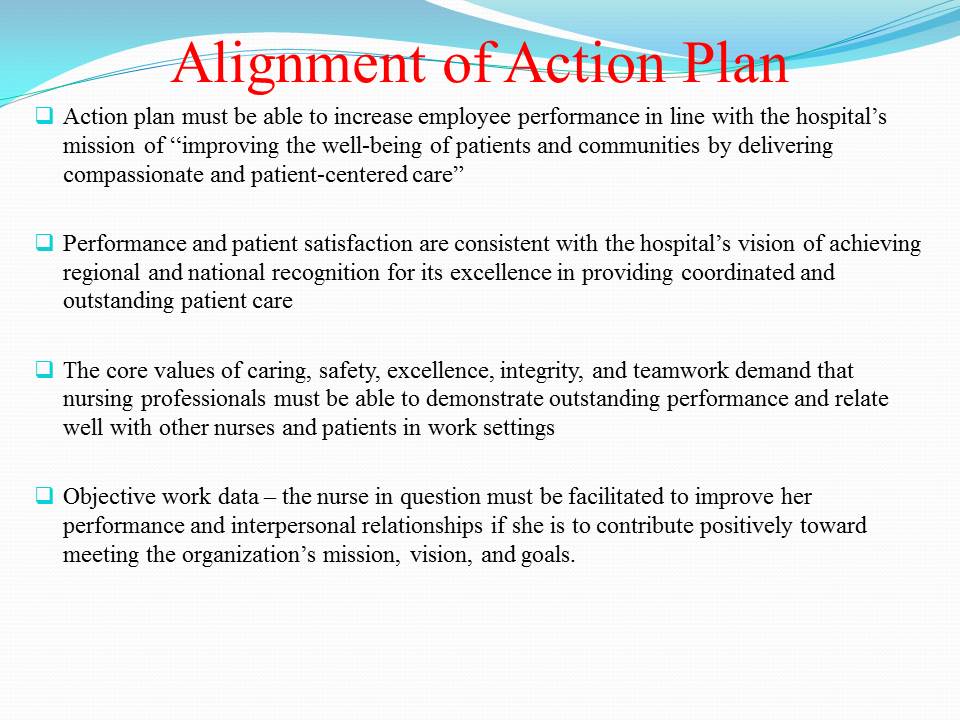
Mentoring & Education Plan
Introducing supportive preceptorship and skills acquisition program at the unit level to encourage the nurse and others with similar problems to advance their skills and experience through preceptorship and role modeling (Jones & Mumford, 2015).
Fostering inclusion and acceptance into the social network at the unit level – can be done through unit meetings, social media, work arrangements, and encouraging nurses to share their personal stories with colleagues (Myler, Buch, Hagerty, Ferrari, & Murphy, 2014).
Building a supportive work environment that not only encourages open communication, feedback, collaboration and sharing, but also provides emotional support and professional guidance (Jones & Mumford, 2015).
Providing basic socialization tips in the organization’s newsletter to ease the transition of new nurses into practice.
Implementing routine seminars that aim to build the confidence of new nurses and improve their clinical and organizational skills (Souder, Beverly, Kitch, & Lubin, 2012).
Implementing a one-on-one engagement with the new nurse to encourage and motivate her to perform, while providing useful feedback intended to spur behavior and attitudinal modification with the view to contributing positively to the attainment of the organization’s strategic goals and objectives (Jones & Mumford, 2015).
The principle of talking in terms of objective data is used to develop an evidence-based preceptorship and skills acquisition program to address the noted medical errors.
The principle of objectiveness is used to develop and implement routine seminars aimed at building confidence as well as improving clinical and organizational skills.
The nurse is encouraged to talk about her fears and challenges with the view to not only foster inclusion and acceptance into the social network, but also to build a supportive work environment.
Lastly, the principle of getting an agreement is useful in ensuring that the one-on-one engagement with the nurse manager will bear fruits in terms of changing the nurse’s performance behaviors and interpersonal relationships.
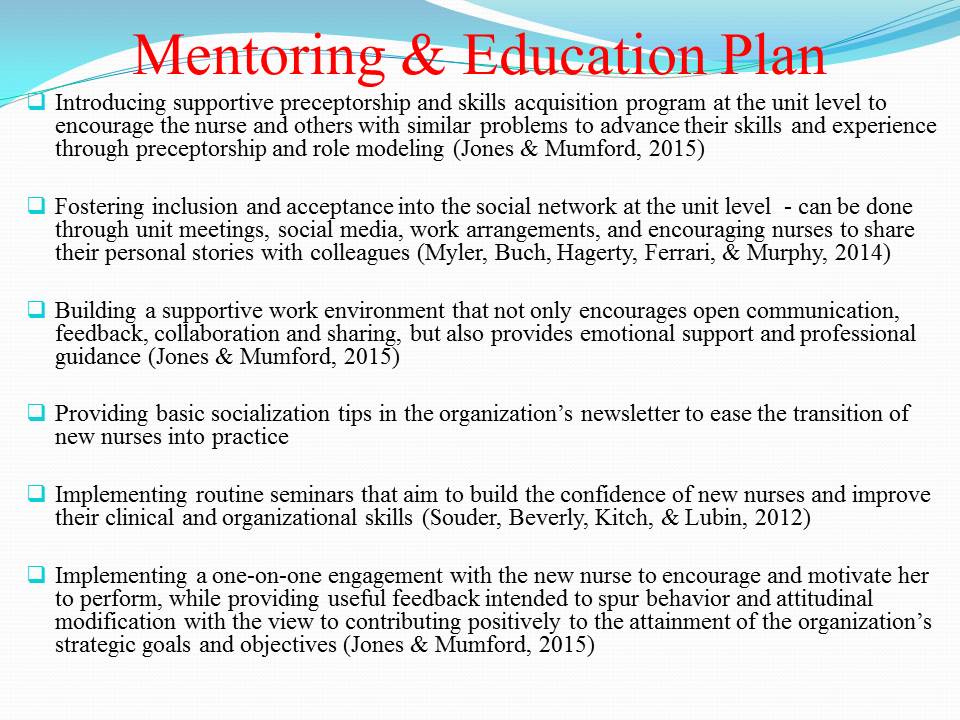
References
Busi, D. (2012). Creating value through simple structured job analysis. Supervision, 73, 8-13. Web.
Dessler, G. (2015). Human resource management (14th ed.). Upper Saddle River, NJ: Prentice Hall.
Jones, J., & Mumford, M. (2015). Nurturing new hires to safe practices. MEDSURG Nursing, 24(2), 1-15. Web.
Myler, L.A., Buch, C.L., Hagerty, B.M., Ferrari, M., & Murphy, S.L. (2014). Mentor satisfaction using a new model of clinical education. Nursing Education Perspectives, 35, 367-371.
Rafferty, R., & Fairbrother, G. (2015). Factors influencing how senior nurses and midwives acquire and integrate coaching skills into practice. Journal of Advanced Nursing, 71, 1249-1259.
Souder, E., Beverly, C.J., Kitch, S., & Lubin, S.A. (2012). Early exposure to geriatric nursing through an externship program. Nursing Education Perspectives, 33, 166-169.